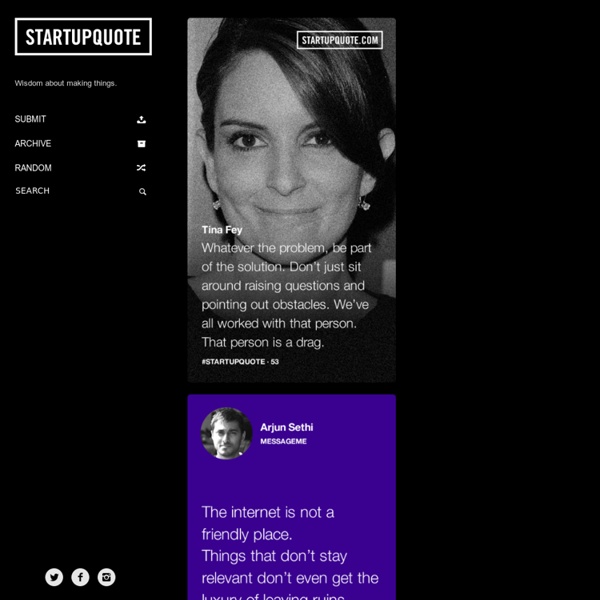



How to Start a Business Online How to Start a Business Online 7 tried and true steps for attracting visitors to your site–and getting them to buy. Article written by Allen Moon, a contributing writer for Entrepreneur.com There is a proven sequence of steps you can follow to guarantee your success when you’re starting a small business online. I’ve seen thousands of people start and grow successful businesses by doing the following: Find a need and fill it.Write copy that sells.Design and build an easy-to-use website.Use search engines to drive traffic to your site.Establish an expert reputation for yourself.Follow up with your customers and subscribers with e-mail.Increase your income through back-end sales and upselling. Reading "Steve Jobs": The Upside Of Unreasonable Demands [Steve Jobs is the most consequential figure in the history of design. So I’ve been taking it slow with Walter Isaacson’s definitive biography of the man, hoping for insights into how Jobs’s personality, timing, and influences managed to produce so much innovation--and what the rest of us might learn from his example. I wanted to share those thoughts with you, in a regular series.
20 Spectacular Photo Manipulations Photo manipulation is by far one of the most popular applications of Photoshop. Images can be manipulated in various ways to communicate a message. Sometimes the manipulation is subtle, like adding something to a photo that wasn’t originally there. Then sometimes the message or idea is unrealistic, but executed in a realistic manner to make it appear believable. Resources of royalty-free images for your tech blog — web development resources There are a lot of collections with great + free image resources out there. And I use them to find great images too. However I found some resources more useful than others, since I’m mostly looking for tech-related images for our web dev blog. "You should have your tongue ripped out": the reality of sexist abuse online You always remember the first time someone calls you ugly on the internet. I imagine -- although it hasn't happened to me -- you always remember the first time someone threatens to rape you, or kill you, or urinate on you. The sheer volume of sexist abuse thrown at female bloggers is the internet's festering sore: if you talk to any woman who writes online, the chances are she will instantly be able to reel off a greatest hits of insults. But it's very rarely spoken about, for both sound and unsound reasons. No one likes to look like a whiner -- particularly a woman writing in male-dominated fields such as politics, economics or computer games.
Please look closely at these fascinating Minimalist Illustration Business in War: a symbol of warfare, with an element of business secreted within To provoke a second glance, Noma Bar expertly uses negative space: his illustrations are formed of both a single image and a series of themed elements that give the final piece its shape. Click through for a selection of highlights from his new book… usersnap Maybe you’ve heard the news. We at Usersnap launched a little side project, called bugtrackers.io. Displaying stories of digital crafters and showing real people behind pixels, bytes and bug reports. That’s the vision for bugtrackers.io. Quipsologies • Quipsologies, is a division of UnderConsideration, chronicling the most curious, creative, and notable projects, stories, and events of the graphic design industry on a daily basis. • Quipsologies uses TypeKit to render P22 Underground, Skolar Web by TypeTogether, and Coquette by Mark Simonson. • Quipsologies is run with Six Apart’s MovableType 6.3.2 • Syndicate / RSS Feed
Five Great Flash Techniques To Improve Your Photography Light So, you moved your light off camera (very good) and looking for some new ways to explore more lighting options. Some of the most interesting light can come from doing the unexpected with your flash. Here are five great techniques to boost your off camera lighting. After exploring those five you’ll have a great toolbox for shooting pictures with off camera flash. By jwlphotography
Blog Before I show you how to get 30% more opens, let me prove something. What’s your normal email open rate? You may think you have an insanely good open-rate on your emails but… 50%+ of the people ARE NOT OPENING your emails. Why work so hard if only 1 out of every 2 people open your emails?
good for a Browser Wallpager - daily quotes designed to inspire by ronsheridan Oct 14